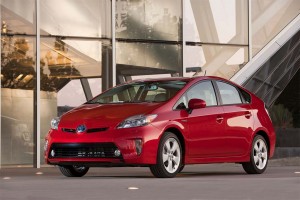
Toyota will expand production of lithium-ion batteries. Expect them to show up in the next-gen Prius and possibly other Toyota products.
Toyota is planning a major increase in production of advanced lithium-ion batteries that could be used in its Prius hybrid and perhaps in other plug-ins or battery-electric vehicles, according to reports from Japan.
The six-fold increase in production of LIon batteries comes as a major shift for the maker which had, until recently, focused exclusively on less powerful but cheaper and more time-tested nickel-metal hydride technology.
The report by Japan’s Nikkei daily business paper says Toyota and battery partner Panasonic will soon be assembling 200,000 lithium-ion batteries annually, largely for use in the popular Prius model. It is unclear if they will be used in just the conventional hybrid version or may also be used for the new Prius plug-in model.
According to a separate report by Reuters, the joint venture would invest about $194 million to expand production, likely at the Toyota plant in Omori, Japan.
The first wave of hybrid vehicles relied on relatively cheap and reliable nickel-metal hydride, or NiMH technology. But a growing number of Toyota’s competitors, including Honda, Hyundai and Kia, have been migrating to lithium technology. LIon batteries can store the same amount of power in little more than half the volume and mass, though they’re currently quite a bit more expensive.
(Porsche Plugs in with 918 Supercar. Click Here for more.)
Toyota officials have, until recently, been committed to older NiMH, in part, because of early problems the maker had experienced. Insiders say that Toyota and Panasonic ran into a series of potentially dangerous problems using one of the most powerful versions of lithium battery technology, one that relied on the chemical cobalt to increase so-called energy density.
But Toyota’s confidence in lithium-ion batteries has begun to increase as it expands production of the Prius Plug-in and the new RAV4-EV battery-electric vehicle, or BEV, both of which use the higher-power technology.
Toyota clearly wants to maintain its position as the world’s leader in battery-based vehicles. It sold a record 1.2 million hybrids last year, the first time it ever topped the 1 million mark, and Prius accounts for roughly half of all worldwide hybrid-electric vehicle sales despite a flood of new competitors.
But the maker has been lagging when it comes to more advanced vehicles, such as plug-ins and BEVs. Nissan and upstart Tesla dominate the latter segment with their Leaf and Model-S battery cars. Toyota’s Prius Plug-in has, however, gained ground rapidly in that segment – though it offers barely a third the range of the Chevrolet Volt.
(New study predicts 100-fold increase in battery charging stations. Click Here for the story.)
Toyota has not said how it plans to use the new lithium batteries, whether they will be dedicated solely to an upgrade of the existing Prius hybrid or could be shared with other battery-based vehicles.
Sales of plug-ins and BEVs currently account for barely 0.5% of the U.S. market while conventional hybrids have gained ground slowly and are now at nearly the 3% mark. Industry analysts believe that higher production levels will help lower costs and that, in turn, should boost demand for all forms of battery-based vehicles.
